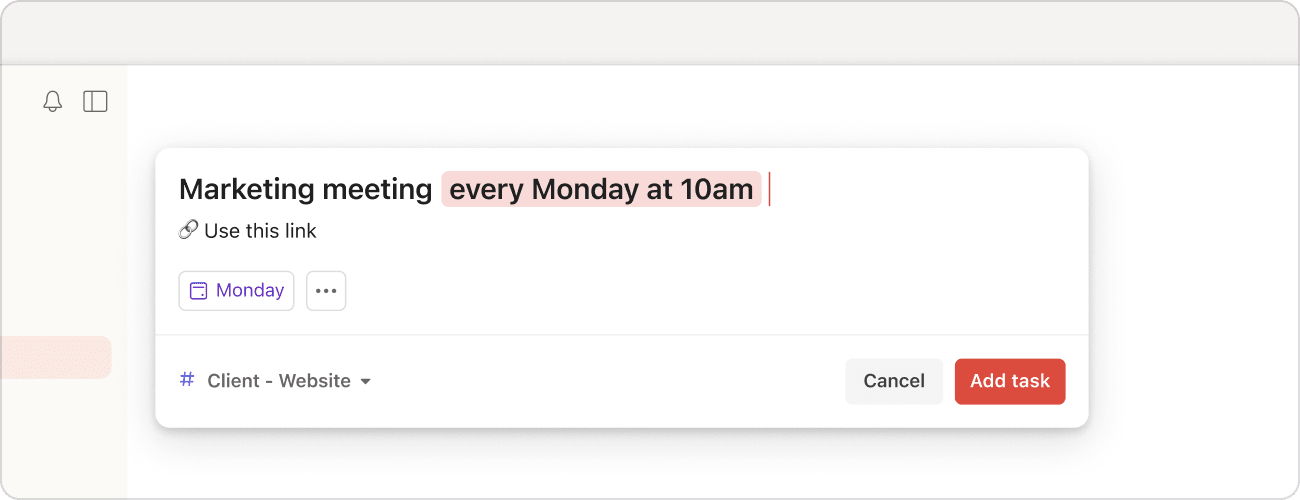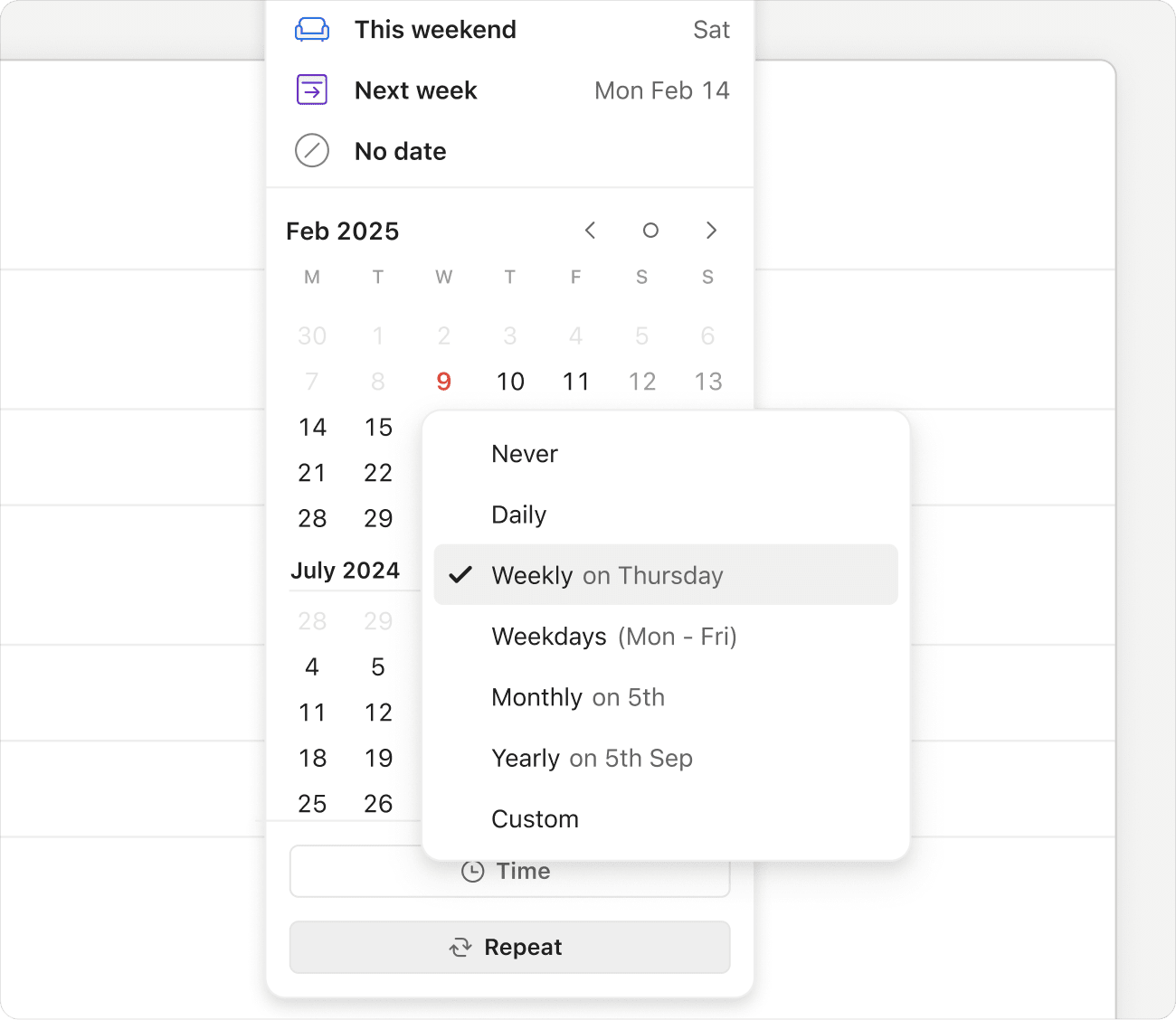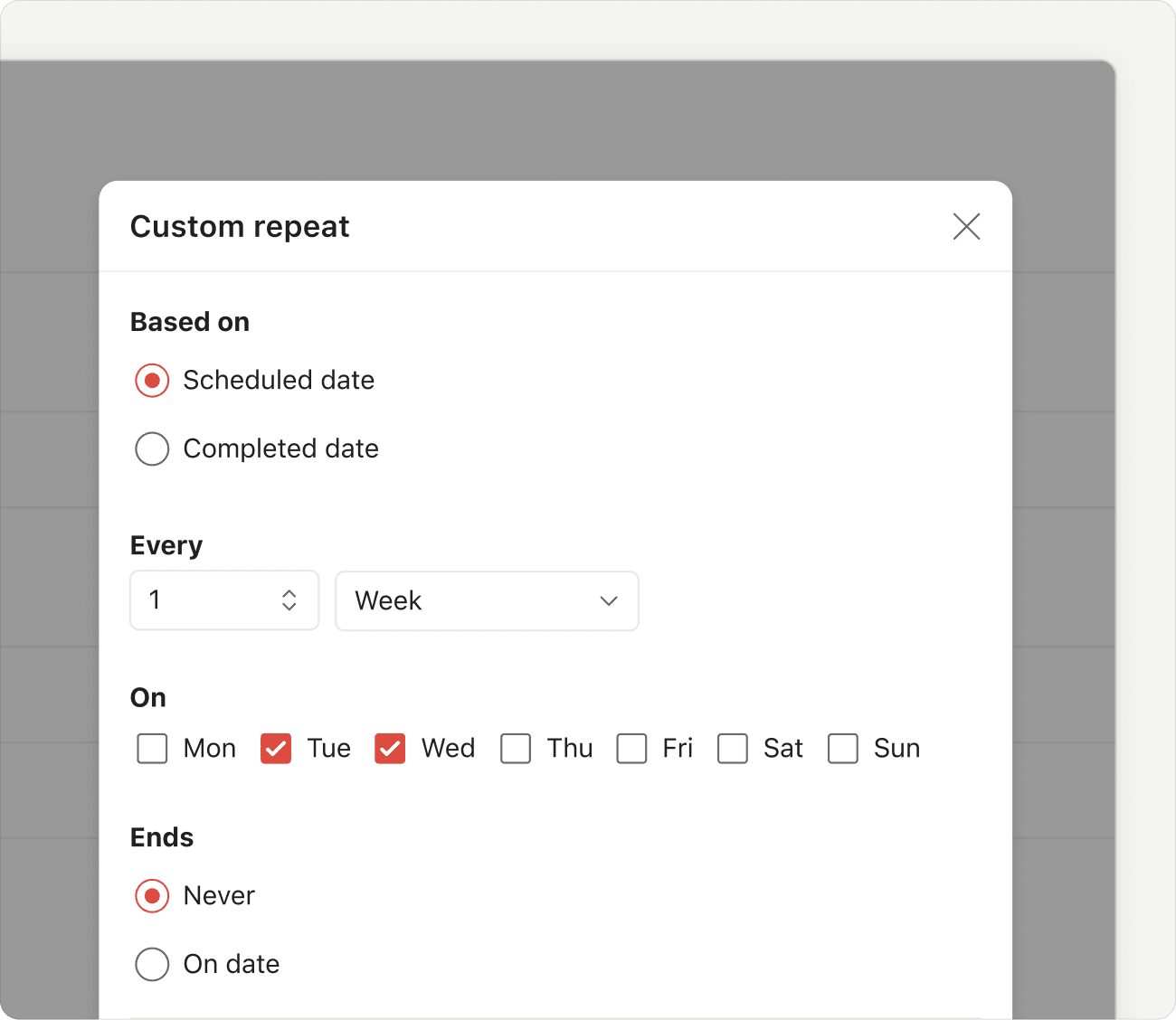You likely have tasks that repeat on a regular basis—writing monthly reports, recycling every week, or calling Mom on her birthday. Instead of creating a new task every single time, add a recurring date! When you complete a task with a recurring date, it automatically shifts to the next date with no extra effort required on your part.
Add a recurring date in the task name

Click
Add task or use the Q hotkey to open Quick Add. In the task name, use natural language to set a recurring date, like every Monday or every weekend. The smart Quick Add automatically recognizes, highlights, and adds the recurring date to the task.

Tap the
Dynamic Add button at the bottom-right. In the task name, use natural language to set a recurring date, like every Monday or every weekend. Todoist automatically recognizes, highlights, and adds the recurring date to the task.

Tap the
Dynamic Add button at the bottom-right. In the task name, use natural language to set a recurring date, like every Monday or every weekend. Todoist automatically recognizes, highlights, and adds the recurring date to the task.
Note
Add a recurring date using the scheduler
Use the scheduler to add a recurring date to a task in Todoist:

- Click a task. The task view will open with all the task details.
- Click Date on the right-hand side. The scheduler will appear.
- Click Repeat. Select one of the suggestions from the list, or select Custom… to create your preferred recurrence.

If you want to create a custom recurring date, a new window will appear with more options:
- Repeat based on the scheduled date (
every) or the completed date (every!). - Select the desired repeat frequency.
- Set a date for when the recurrence ends, or if this is an ongoing recurrence.
Click Save to confirm. The recurring date is added to the task, and appears in the date field of the scheduler.
If you need to edit the recurring date, click the date field and make your changes. To remove it from the task, click the dismiss icon at the bottom of the scheduler.

- Tap a task. The task view will open with all the task details.
- Tap Date. The scheduler will appear.
- Tap Repeat. Select one of the suggested recurring dates, or tap Custom to create your preferred recurrence.

If you want to create a custom recurring date, a new window will appear with more options:
- Repeat based on the scheduled date (
every) or the completed date (every!). - Select the desired repeat frequency.
- Set a date for when the recurrence ends, or if this is an ongoing recurrence.
Tap Save to confirm. The recurring date is added to the task, and appears in the date field of the scheduler.
If you need to edit the recurring date, tap the date field and make your changes. To remove it from the task, tap No Date.

- Tap a task. The task view will open with all the task details.
- Tap Date. The scheduler will appear.
- Tap Repeat. Select one of the suggested recurring dates, or tap Custom to create your preferred recurrence.

If you want to create a custom recurring date, a new window will appear with more options:
- Repeat based on the scheduled date (
every) or the completed date (every!). - Select the desired repeat frequency.
- Set a date for when the recurrence ends, or if this is an ongoing recurrence.
Tap Save to confirm. The recurring date is added to the task, and appears in the date field of the scheduler.
If you need to edit the recurring date, tap the date field and make your changes. To remove it from the task, tap No Date.
Disregard a recurring date
A date may be a part of a task name rather than when the task is due. For the task "Create monthly report", Todoist automatically highlights the word monthly as a recurring date. Click or tap the word to disregard it. You can also turn off smart date recognition.
Use recurring dates
Recurring dates come in a wide variety of formats, so you can consistently complete your tasks. Whether it's to buy milk every week or take medication every 12 hours starting at 07:00 PM, there’s a recurring date for almost anything.
A heads-up though! A task's future occurrences are hidden by default. If you need to see all occurrences of a task, open your project, apply the calendar layout, and turn on Future occurrences.
Huge thanks to Todoist ambassador, Leighton Price, for providing examples for this article.
Let's start with basic examples:
| Type this | To add this recurring date |
|---|---|
| every day or daily | Every day starting from today |
| every morning | Every day at 9am |
| every afternoon | Every day at 12pm |
| every evening | Every day at 7pm |
| every night | Every day at 10pm |
| every weekday or every workday | Every Monday, Tuesday, Wednesday, Thursday, and Friday |
| every week or weekly | Every week starting today |
| every weekend | Every Saturday |
| every month or monthly | Every month starting today |
| every 3rd friday | Every 3rd Friday of the month |
| every 27th or every 27 | Every 27th of the month |
| every year or yearly | Every year starting today |
| every jan 27th | Every January 27th |
| every last day | Every last day of the month |
| every hour | Every hour starting from now |
Nina
Customer Experience
If you schedule your recurring task for every day, your task will set its next date based on the date you complete the task. This means that if your task was scheduled for yesterday and you complete it today, the task will not move to today. It will instead move to tomorrow's date. If you tend to complete tasks after midnight, consider using a recurring due date like every 24 hours starting 6 am as a workaround.
You can use natural language to schedule a recurring task with a start and end date:
| Type this | To add this recurring date |
|---|---|
| everyday starting on aug 3 or everyday from aug 3 | Every day starting on August 3 |
| everyday ending aug 3 or everyday until aug 3 | Every day starting today and ending on August 3 (inclusive) |
| every Wednesday, Friday, Saturday ending Saturday | This Wednesday, Friday, and Saturday only |
| everyday for 3 weeks | Every day for the next 3 weeks starting today |
| everyday from 10 May until 20 May | Every day starting May 10th ending May 20th (inclusive) |
| Type this | To add this recurring date |
|---|---|
| every 12 hours starting at 9pm | Every day at 9am and 9pm |
| every mon, fri at 20:00 | Every Monday and Friday at 20:00 |
| every 3rd friday 8pm | Every 3rd Friday of the month at 8pm |
| every 6 weeks at 09:00 starting jan 3 | Every 6 weeks starting on January 3rd, at 9am |
| every fri at noon | Every Friday at 12pm |
| every mon in the morning | Every Monday at 9am |
| every wed in the evening | Every Wednesday at 7pm |
| Type this | To add this recurring date |
|---|---|
| every monday, friday or ev monday, friday or every mon, fri | Every Monday and Friday |
| every 2, 15, 27 or ev 2, 15, 27 | Every 2nd, 15th & 27th of the month |
| every 14 jan, 14 apr, 15 jun, 15 sep | Every January 14th, April 14th, June 15th & September 15th |
| every 15th workday, first workday, last workday | Every 15th workday, every first and every last workday of a month |
| every 1st wed jan, 3rd thu jul | 1st Wednesday of each January and 3rd Thursday of each July |
You can create a recurring task that repeats at regular intervals from either the original task date or from the task's completed date by using every or every!, respectively. Here's how:
- Every: Completing a task that has a date of every 3 months will set the task’s date to 3 months from the task's original date. So if you created a task on January 10th with a date of every 3 months, it will recur on Jan 10, Apr 10, July 10, etc regardless of when you complete the task.
- Every!: When you complete a task with a date of every! 3 months, it will set the next date to 3 months after the day you completed the task. So if you completed the task on January 20th, the next occurrence of the task will be April 20th.
Here are some examples of recurring dates that use every or every!:
| Type this | To add this recurring date |
|---|---|
| every 3 days | Every 3 days starting today |
| every first workday | Every first working day (Mon to Fri) of the month |
| every last workday | Every last working day (Mon to Fri) of the month |
| every 3 workday | Every 3rd work day (mon-Fri only) from today |
| every quarter or quarterly | Every 3 months starting from today |
| every! 3 hours | Every 3 hours from the time the task is completed |
| every! 5 days | Every 5 days from the day on which the task is completed, starting today |
| every! 2 months | Every 2 months from the day on which the task is completed, starting today |
| after 10 days | Once the date is entered, it will change to every! 10 days effective from today |
| after 10 days starting 1 Aug | Once the date is entered, it will change to every! 10 days effective from August 1 |
Every week is a dynamic recurring date. This means that the task is scheduled according to when you last completed the task.
For example, if you complete a recurring task that has the date every week on a Monday, the task will be scheduled for the following Monday. If you complete the task on a Tuesday, the task will be scheduled for the following Tuesday.
Todoist will only schedule recurring tasks on future dates. If your recurring task is overdue past the date the task was next due to occur, Todoist will schedule the next occurrence on the next future recurring date when you complete the task.
For example, if you create a task with the date every 3 months starting from 15 Jan 2023 and you complete the task on 19 September 2023, Todoist will schedule the next occurrence of the task to 15 October 2023, because 15 April 2023 and 15 July 2023 have already passed.
| Type this | To add this recurring date |
|---|---|
| every other day | Every other day starting from today |
| every other week | Every other week starting from today |
| every other month | Every other month starting from today |
| every other year | Every other year starting from today |
| every other fri | Every other Friday, starting with the second Friday from now (and not the next upcoming Friday) |
Use these keywords to schedule tasks during specific holidays:
| Type this | To add this recurring date |
|---|---|
| new year day | January 1 |
| valentine or Valentine's Day | February 14 |
| halloween | October 31 |
| new year eve | December 31 |
Quick tip
Limitations with recurring dates
There are several recurring date formats that aren't supported in Todoist. Here's a list of unsupported date formats, so you can edit the recurring date right away:
| Unsupported query | Why it's not supported | Use instead |
|---|---|---|
| Every mon at 8pm, tue at 9pm | Todoist can't combine multiple days and hours in a single rule. | Create a separate task with each recurring date and time combination.
|
Every X months on the first Friday of the month | Todoist can't combine a monthly interval with a specific day of the week. | Set the task to repeat on the specific day of the month you need. every 1st Friday of Jan, 1st Friday of Apr, 1st Friday of July, 1st Friday of Oct |
every Nth except weekends | A task can't recur on a specific day of the month while skipping weekends. |
Add every 7th workday |
| every day except | Todoist needs to know what to exclude from the recurrence. | Be specific about the days you want the task to skip. every tues, wed, thurs, fri |
Reschedule a task with a recurring date
If you suddenly need to put a task off for another day, reschedule the task.
When rescheduling a task with a recurring date, the next recurrence depends on the type of recurring date:
- Absolute recurring date: the next recurrence will always be on that specific day of the week or date of the month. For example:
every Tuesorevery 15th day. - Relative recurring date: the next recurrence will continue based on the newly set date. There's no option to reschedule them where they would still maintain the original pattern. For example:
every weekorevery 12 days.
To postpone a recurring task, use the task scheduler and pick a new date. If you type a new date for a recurring task, you will completely change the task's date and lose the recurrence.
Rescheduling or postponing a recurring task changes only the next occurrence. For example, if a task is due every Monday at 9am and you reschedule it to 11am, the next instance will be due at 11am. However, after you complete it, the schedule returns to every Monday at 9am.
To permanently change a recurring schedule (for example, to every Tuesday or every Monday at 11am), edit it in the task name and update the recurring day and/or time directly.
Melis · Customer Experience
Best practices for recurring dates
When adding a recurring date, follow these best practices to ensure Todoist recognizes and adds it correctly:
- Place the start date at the end:
every 14 days 7am starting 1 Nov - Place the time after the first date:
every other Tues 7am starting 1 Nov - Specify the days of the week the date will recur:
every mon, tues, wed, and fri
Marija · Customer Experience
Get in touch
Start creating tasks with recurring dates to build strong habits over time. If you run into any issues scheduling recurring dates, get in touch with us. We – Summer, Keita, Stef, or any of our other teammates – will make sure you stay on track with all your recurring tasks.